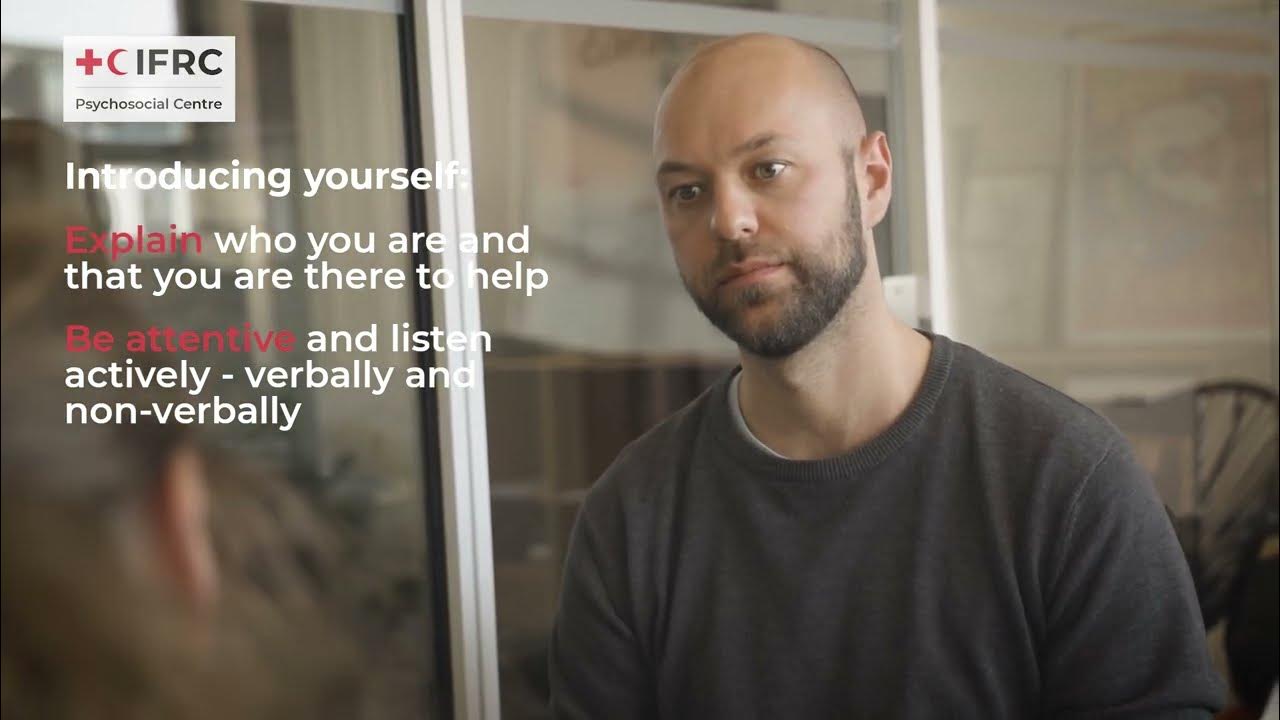Psychological First Aid - Support during mental trauma, natural disasters, wars, mass crime
Summary
TLDRThe video explains the importance of Psychological First Aid (PFA) during crises, such as natural disasters, violence, or accidents. PFA offers compassionate, practical support to individuals suffering emotionally or physically. It emphasizes three core steps: Look, Listen, and Link. First, assess the safety of the environment and the person's needs. Then, listen empathetically without judgment, and finally, connect them with necessary resources. PFA doesn't require professional counseling, but it encourages compassionate care while respecting the person's feelings and cultural background. Everyone can play a role in supporting those affected by crises.
Takeaways
- 🌪️ Crises such as natural disasters, war, accidents, or incidents of violence can impact individuals, families, and communities, leading to a range of emotional and physical responses.
- 🚑 Psychological first aid is crucial for recovery from trauma, similar to the importance of physical first aid after an injury.
- 🤝 Anyone can learn to provide psychological first aid, regardless of their professional background, which includes practical care, assessing needs, listening, comforting, and protecting from further harm.
- 🚫 Psychological first aid is not professional counseling and does not involve pressuring individuals to recount traumatic events or share their feelings.
- 🌐 It's important to understand the crisis context, local culture, and available resources to provide culturally appropriate and dignified support.
- 👂 Listening is a core component of psychological first aid, requiring patience, calmness, and empathy without interrupting or rushing the person.
- 🔗 The 'Link' step involves connecting people to resources that meet their basic needs and helping them find solutions to their problems, which can be empowering.
- 💪 Encouraging positive coping behaviors and identifying extra support needs for vulnerable groups are part of comprehensive psychological first aid.
- 🤗 Recognizing one's own limitations and seeking support from others is essential for those providing psychological first aid to avoid burnout.
- 💖 Caring and being involved in the crisis response is a significant step, and it's important to take care of oneself while helping others.
Q & A
What are some common crises mentioned that can affect individuals and communities?
-Common crises mentioned include natural disasters like floods and hurricanes, wars, accidents, incidents of violence and crime, which can impact individuals, families, or entire communities.
How do crises affect people emotionally?
-Crises can lead to a range of emotional responses such as sadness, anxiety, numbness, or being overwhelmed. People may also feel uncertain about the future and struggle with processing their losses.
What is Psychological First Aid (PFA) and why is it important?
-Psychological First Aid is a humane, supportive response to someone in distress. It is important because it provides early emotional care, which is crucial for healing and preventing further psychological harm after a traumatic event.
How does Psychological First Aid differ from professional counseling?
-Unlike professional counseling, PFA does not require a detailed recounting of the traumatic event and doesn’t pressure individuals to share their feelings. It's focused on offering immediate support rather than long-term therapy.
What are the three core steps of Psychological First Aid?
-The three core steps of Psychological First Aid are Look, Listen, and Link. Look for immediate needs and safety concerns, Listen with care and empathy, and Link people to relevant resources for their basic needs and further support.
Why is cultural awareness important in providing Psychological First Aid?
-Cultural awareness ensures that support is offered in a way that is appropriate and respectful of the person’s customs. This includes knowing the crisis situation, local customs, and respecting personal boundaries, such as gender preferences or privacy.
What should you avoid doing while listening to someone in distress?
-You should avoid judging the person, questioning their actions, or suggesting what they should have done. Avoid saying you understand their feelings, and do not pressure them to recount their trauma.
How can you empower someone going through a crisis?
-Empowerment can be achieved by involving people in solving their own problems, providing accurate information, and encouraging positive coping behaviors like resting, connecting with loved ones, or engaging in religious rituals.
Which groups of people may need extra support during a crisis?
-People who may need extra support include children and adolescents separated from their caregivers, those with physical or mental disabilities, pregnant women, the elderly, and marginalized groups in society.
What should a caregiver do to maintain their own well-being while providing Psychological First Aid?
-Caregivers should take time to eat, sleep, and recharge their energy. It's important to recognize personal limitations and seek support from others when needed to prevent burnout.
Outlines

This section is available to paid users only. Please upgrade to access this part.
Upgrade NowMindmap

This section is available to paid users only. Please upgrade to access this part.
Upgrade NowKeywords

This section is available to paid users only. Please upgrade to access this part.
Upgrade NowHighlights

This section is available to paid users only. Please upgrade to access this part.
Upgrade NowTranscripts

This section is available to paid users only. Please upgrade to access this part.
Upgrade NowBrowse More Related Video

Dukungan Psikologi Awal (DPA) Ikatan Psikolog Klinis (IPK) Indonesia

BPAG 171 आपदा प्रबंधन || Unit 1 - आपदा का अर्थ और वर्गीकरण|| #bpag172 #ignouassignment

Building sustainable mental health systems during and after emergencies

Psychological First Aid: Look Listen Link

KENAPA DANA DARURAT ITU PENTING

Basic First Aid for Kids | First Aid Training!
5.0 / 5 (0 votes)